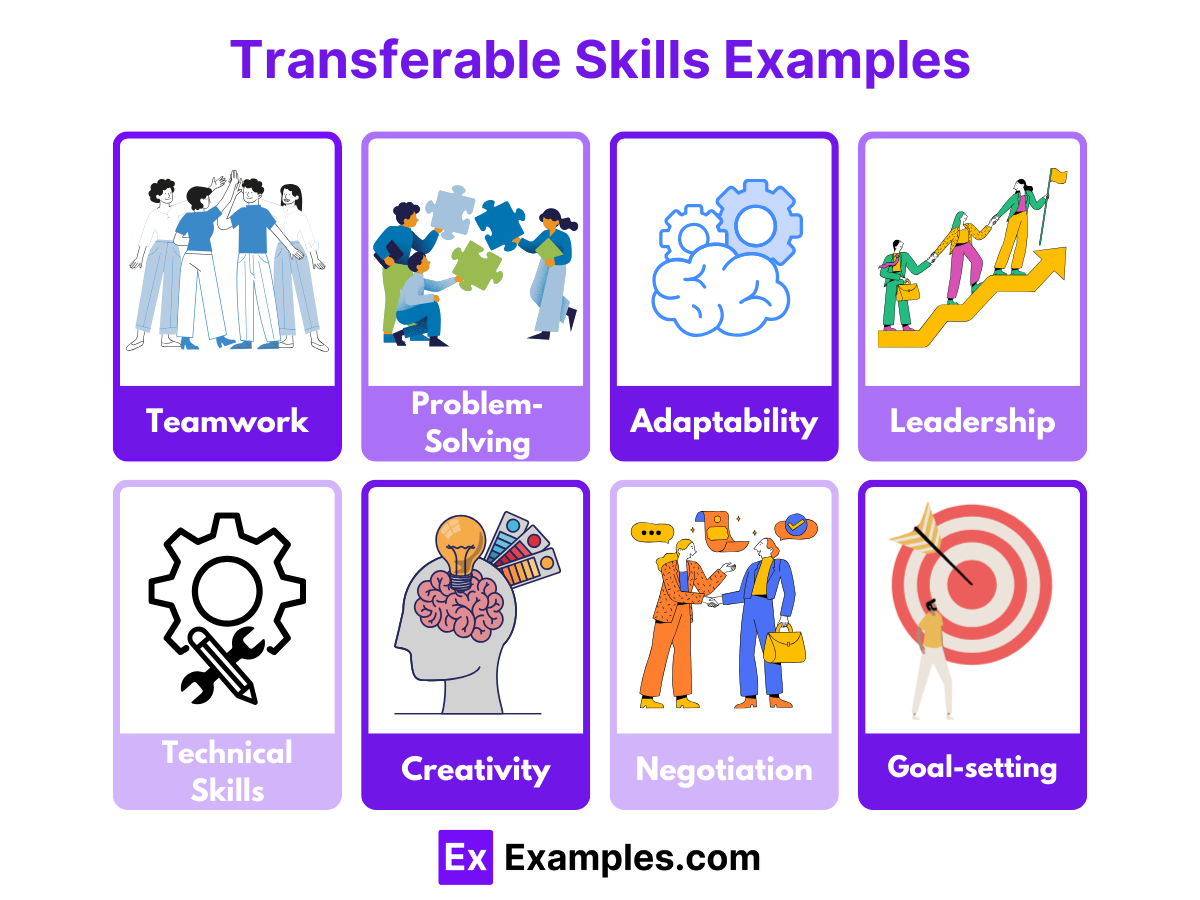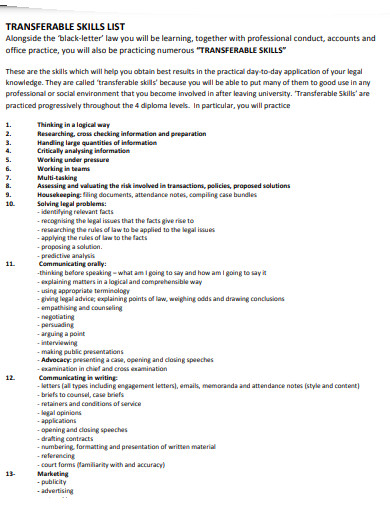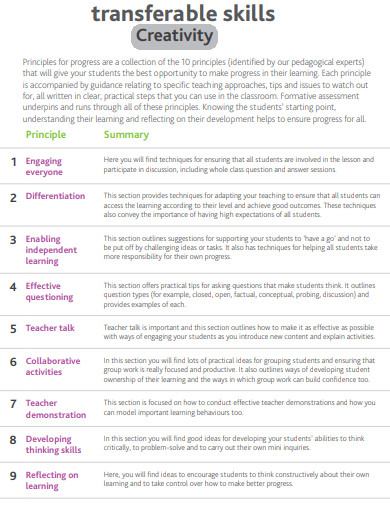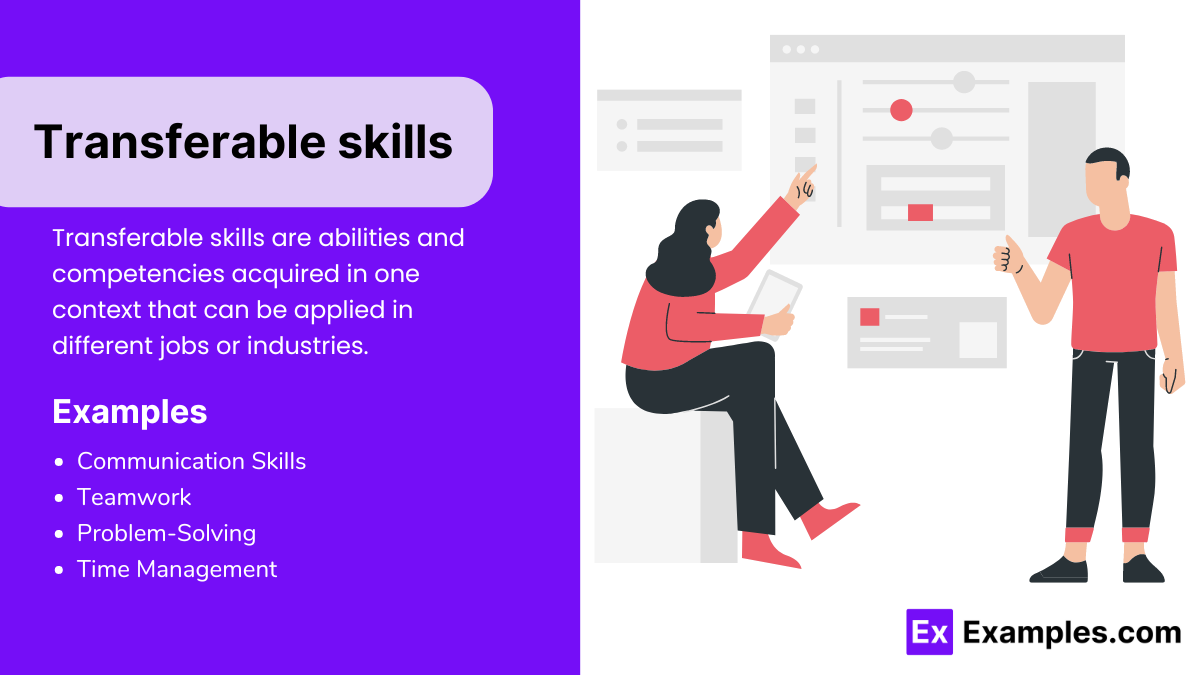70+ Transferable Skills Examples
Everyone has a set of skills they can apply on their specialized or general resume, which they can use to apply for a specific job or position. People have categorized these sets of skills into two categories which are hard skills and soft skills or transferable skills.
What Are Transferable Skills?
Transferable skills are abilities and competencies that are useful in various jobs and industries. These skills are not specific to a particular role or sector but can be applied in many different professional settings. They are essential because they enhance employability and adaptability in the ever-changing job market.
Examples of Transferable Skills

| Transferable Skill | Examples |
|---|---|
| Communication Skills | Writing reports, giving presentations, active listening |
| Teamwork | Collaborating on projects, participating in meetings, sharing responsibilities |
| Problem-Solving | Troubleshooting, developing strategies, implementing processes |
| Time Management | Prioritizing tasks, creating schedules, meeting deadlines |
| Adaptability | Learning new software, adjusting to management changes, handling challenges |
| Leadership | Managing teams, mentoring, leading projects |
| Critical Thinking | Evaluating data, conducting research, making decisions |
| Interpersonal Skills | Networking, resolving conflicts, customer service |
| Organizational Skills | Managing files, tracking tasks, organizing events |
| Attention to Detail | Proofreading, checking data, ensuring compliance |
| Technical Skills | Using software, handling equipment, developing solutions |
| Creativity | Developing campaigns, designing products, creating content |
| Numeracy Skills | Budgeting, data analysis, statistical analysis |
| Project Management | Managing timelines, coordinating resources, delivering projects |
| Customer Service | Handling inquiries, resolving complaints, ensuring satisfaction |
Transferable Skills Examples for Resume
- Communication: Effectively conveying information and ideas to others.
- Teamwork: Collaborating with others to achieve common goals.
- Problem-solving: Identifying issues and developing solutions.
- Time management: Organizing and planning to use time efficiently.
- Leadership: Guiding and motivating a group towards achieving objectives.
- Adaptability: Adjusting to new conditions and challenges.
- Critical thinking: Analyzing facts to make informed decisions.
- Project management: Planning and overseeing projects to ensure they are completed on time and within budget.
- Negotiation: Reaching agreements through discussion and compromise.
- Conflict resolution: Resolving disagreements in a constructive manner.
Transferable Skills Examples for Students
- Research skills: Finding and analyzing information from various sources.
- Note-taking: Recording information effectively during lectures and readings.
- Public speaking: Presenting information clearly and confidently in front of an audience.
- Collaboration: Working well with peers on group projects.
- Organizational skills: Keeping tasks and materials in order for efficient work.
- Creativity: Thinking outside the box to generate new ideas.
- Active listening: Fully concentrating on what is being said to understand the message.
- Writing skills: Communicating ideas clearly and effectively in written form.
- Goal-setting: Setting and working towards academic and personal objectives.
- Technical proficiency: Using technology tools and software effectively for academic tasks.
Transferable Skills Examples for Teachers
- Curriculum development: Designing and planning educational programs.
- Classroom management: Maintaining a productive and respectful learning environment.
- Assessment and evaluation: Measuring student progress and understanding.
- Mentoring: Guiding and supporting students’ personal and academic growth.
- Instructional design: Creating engaging and effective lesson plans.
- Empathy: Understanding and addressing students’ individual needs and concerns.
- Patience: Remaining calm and supportive, especially in challenging situations.
- Motivational skills: Inspiring students to achieve their best.
- Differentiated instruction: Tailoring teaching methods to accommodate diverse learners.
- Conflict mediation: Helping students resolve disputes constructively.
Transferable Skills Examples in Business
- Strategic planning: Setting long-term goals and determining actions to achieve them.
- Market analysis: Assessing market conditions to inform business decisions.
- Customer service: Providing assistance and support to clients and customers.
- Budget management: Planning and controlling financial resources.
- Sales forecasting: Predicting future sales based on analysis of data.
- Branding: Creating and managing the public image of a business.
- Data analysis: Interpreting data to make informed business decisions.
- Supply chain management: Overseeing the production and distribution process.
- Financial reporting: Preparing and presenting financial statements.
- Operations management: Ensuring efficient business operations.
Transferable Skills Examples in Sports
- Team coordination: Working together effectively to achieve team objectives.
- Physical endurance: Sustaining physical effort over long periods.
- Strategic thinking: Planning tactics and strategies for game success.
- Discipline: Maintaining self-control and focus on training and performance.
- Resilience: Bouncing back from setbacks and injuries.
- Quick decision-making: Making fast and accurate decisions under pressure.
- Agility: Moving quickly and easily in response to changing situations.
- Sportsmanship: Showing respect and fair play on and off the field.
- Leadership on the field: Guiding and motivating teammates during games.
- Goal-setting: Setting and working towards performance targets.
Transferable Skills Examples in Nursing
- Patient care: Providing comprehensive care and support to patients.
- Clinical documentation: Accurately recording patient information and medical histories.
- Medication administration: Safely preparing and giving medications to patients.
- Health education: Teaching patients about health and wellness.
- Compassion: Showing kindness and understanding to patients.
- Attention to detail: Ensuring accuracy in all aspects of patient care.
- Crisis management: Handling medical emergencies effectively.
- Team collaboration: Working with healthcare professionals to provide patient care.
- Diagnostic skills: Assessing symptoms and determining medical conditions.
- Emotional intelligence: Understanding and managing emotions in a healthcare setting.
Why Do Employers Seek Transferable Skills?
Adaptability
Employers value transferable skills because they demonstrate an individual’s ability to adapt to various roles and tasks. This adaptability is crucial in dynamic work environments where job roles can evolve quickly.
Efficiency
Transferable skills can lead to increased efficiency. Employees with these skills can quickly get up to speed and contribute effectively, reducing the need for extensive training.
Versatility
Workers with a broad range of transferable skills are versatile and can handle multiple responsibilities. This versatility makes them valuable assets in any team, as they can step into different roles as needed.
Problem-Solving
Transferable skills often include critical thinking and problem-solving abilities. Employers seek these skills to ensure that their workforce can address challenges and find innovative solutions.
Communication
Effective communication is a key transferable skill that employers look for. Good communicators can facilitate better teamwork and collaboration, leading to improved productivity and workplace harmony.
Leadership Potential
Transferable skills such as leadership and teamwork are indicators of an employee’s potential for future advancement. Employers seek these skills to identify and develop future leaders within the organization.
Cost-Effectiveness
Hiring employees with transferable skills can be more cost-effective. These individuals require less training and can quickly fill gaps within the organization, leading to better resource allocation.
How to Obtain Transferable Skills?
Transferable or soft skills are easy to learn, but it requires the person to understand the various theories, contexts, themes, and tones that make up the elements and characteristics of the specific skill. If you need transferable or soft skills examples, samples, and articles, you may use any of the links in the sections above.
Step 1: Choose a Transferable Skill You Want to Learn
You must begin by choosing a transferable skill you want to learn about in your free time. This will not only provide you with a direction you will use to learn the skill, but it will also determine the difficulty and time you will spend practicing and learning the skill.
Step 2: Obtain Basic Comprehension of the Chosen Transferable Skill
Before you will learn the transferable skill of your choice, you must first obtain basic comprehension and knowledge of the elements that will comprise the transferable skill. For example, assertive communication requires the person to properly learn how to manipulate and use their body language and facial expressions.
Step 3: Learn How to Practice the Transferable Skill
Like all skills, you must learn to practice and use the chosen transferable skill as daily as possible. This will not only allow you to unconsciously use the transferable skill, but it will also improve the effectiveness of your chosen transferable skill.
Step 4: Integrate the Transferable Skill into One’s Daily Life
You should integrate and use the transferable skill in one’s daily and professional life. Transferable skills will require you to properly use them as often as possible and incorporating them in one’s daily life will help you master the said transferable skill.
- Attend Events: Participate in industry conferences, seminars, and networking events.
- Online Presence: Build and maintain a professional online presence through platforms like LinkedIn.
- Follow Up: After meeting new contacts, follow up with them to build and maintain relationships.
How to Use Your Transferable Skills to Grow Your Career
Identify Your Transferable Skills
- Self-assessment: List your skills from previous roles.
- Seek feedback: Ask colleagues or mentors about your strengths.
- Skills inventory: Use tools like skills assessments to identify key abilities.
Map Skills to New Opportunities
- Job descriptions: Look for roles that list your transferable skills.
- Industry research: Understand which industries value your skills.
- Networking: Talk to professionals in desired fields about how your skills can be applied.
Tailor Your Resume and Cover Letter
- Highlight relevant skills: Customize your resume to emphasize transferable skills.
- Use keywords: Match your skills with the language used in job postings.
- Provide examples: Include specific instances where your skills made an impact.
Leverage Skills in Interviews
- Prepare stories: Have examples ready that demonstrate your transferable skills in action.
- Be confident: Show how your skills make you a strong candidate.
- Connect the dots: Explain how your skills can benefit the potential employer.
Continuous Learning and Development
- Seek training: Take courses to strengthen your transferable skills.
- Stay updated: Keep up with trends in your desired industry.
- Practice regularly: Use your skills in various settings to keep them sharp.
Network and Seek Mentorship
- Build relationships: Connect with professionals in your field of interest.
- Find mentors: Look for guidance from experienced individuals.
- Join professional groups: Engage with communities that value your skills.
Adaptability and Flexibility
- Be open to new roles: Consider positions that may not be a direct fit but value your skills.
- Show willingness to learn: Demonstrate your ability to acquire new knowledge and skills.
- Stay flexible: Be ready to pivot and take on different challenges.
How to Highlight Your Transferable Skills in a Resume
Identify Relevant Transferable Skills
- Communication: Effective verbal and written communication.
- Leadership: Ability to lead and manage teams.
- Problem-Solving: Analytical thinking and creativity.
- Time Management: Efficient handling of tasks and deadlines.
- Adaptability: Flexibility and ability to learn quickly.
Match Skills to Job Description
Analyze the job description to identify key skills required for the role. Then, align your transferable skills with those listed in the job description.
Highlight Skills in Different Sections
Summary or Objective
Include key skills in the summary or objective section of your resume. Briefly describe how these skills make you a good fit for the role.
Example: Experienced project manager with strong leadership, problem-solving, and communication skills seeking to leverage expertise in team management and strategic planning in a dynamic work environment.
Work Experience
Use bullet points to list your achievements and responsibilities. Quantify your impact with numbers to show the results of your work, and focus on how your transferable skills contributed to your success.
Example:
- Led a team of 10 to successfully complete projects on time, improving client satisfaction by 15%.
- Utilized problem-solving skills to streamline processes, reducing costs by 20%.
- Demonstrated strong communication skills by effectively liaising between clients and team members.
Skills Section
Create a separate section to list your transferable skills explicitly. Use keywords that align with the job description.
Example: Transferable Skills: Leadership, Communication, Problem-Solving, Time Management, Adaptability.
Education and Certifications
Include relevant coursework and certifications that showcase your transferable skills.
Example:
- Bachelor of Business Administration, XYZ University: Coursework in Leadership and Management, Strategic Planning, Effective Communication.
- Certification: Project Management Professional (PMP).
Use Action Verbs and Results
Start bullet points with strong action verbs and highlight the impact of your skills with specific examples.
Example:
- Spearheaded a team project that resulted in a 30% increase in efficiency.
- Communicated effectively with cross-functional teams, leading to a successful product launch.
Tailor Your Resume for Each Job
Customize your resume to emphasize the most relevant transferable skills for each job application. Use specific examples that are tailored to the job.
Importance of Transferable Skills in the Job Market
Adaptability
Transferable skills, such as communication, problem-solving, and teamwork, are crucial in today’s job market because they allow individuals to adapt to different roles and industries. This adaptability is essential as the job market continually evolves.
Versatility
Having transferable skills makes candidates versatile and capable of performing a wide range of tasks. Employers value this versatility because it reduces the need for extensive training and enables employees to take on various responsibilities.
Employability
Transferable skills enhance employability. Candidates with a strong set of these skills are often seen as more attractive to employers, as they bring value beyond their technical expertise. This can lead to more job opportunities and career advancement.
Efficiency
These skills contribute to efficiency in the workplace. Effective communication, for example, can prevent misunderstandings and streamline processes. Problem-solving abilities enable employees to overcome challenges quickly, enhancing overall productivity.
Career Growth
Transferable skills support long-term career growth. They enable individuals to pivot to new roles or industries, keeping their career trajectory upward even as specific job demands change. This flexibility is essential in a dynamic job market.
Networking
Transferable skills also aid in networking. Strong interpersonal skills can help individuals build professional relationships, opening doors to new opportunities and collaborations.
Non-Transferable Skills
Non-transferable skills are those abilities or expertise that are specific to a particular job, task, or industry and are not easily applicable or useful in other roles or sectors. These skills are often highly specialized and tailored to specific functions within a given context.
Examples of Non-Transferable Skills
1. Industry-Specific Software Proficiency
- Example: Mastery of a proprietary software used exclusively in a particular company or industry.
2. Machinery Operation
- Example: Operating a specific type of industrial machine that is not used outside of a particular manufacturing process.
3. Knowledge of Company-Specific Procedures
- Example: Familiarity with the unique internal protocols and workflows of a specific organization.
4. Specialized Technical Skills
- Example: Skills in a highly specialized area of engineering or science that are not commonly required in other fields.
Transferable Skills vs. Soft Skills
| Transferable Skills | Soft Skills |
|---|---|
| Skills that can be applied in various roles or industries | Interpersonal and personal attributes that influence how you work |
| Examples: project management, data analysis, technical writing | Examples: communication, teamwork, adaptability |
| Often specific and technical in nature | Often related to emotional intelligence and behavior |
| Can be learned through education and experience | Typically developed through experience and personal development |
| Measurable and quantifiable | More subjective and harder to measure |
What Are Technical Skills?
Technical skills refer to the specific knowledge and abilities needed to perform tasks in various fields, particularly those involving technology and applied sciences. These skills are usually learned through education and training and are essential for many professional roles.
How to Identify Your Transferable Skills
1. Understand What Transferable Skills Are
Transferable skills are talents and abilities that are not specific to a particular job or industry. They can be used in different roles and sectors. Examples include communication, problem-solving, and teamwork.
2. Review Your Job Descriptions and Responsibilities
Look at your current and past job descriptions. Highlight the skills you used regularly. Consider tasks such as:
- Managing projects
- Leading a team
- Writing reports
- Customer service
3. Reflect on Your Daily Activities
Think about the activities you do every day, both at work and in your personal life. Ask yourself:
- What tasks do I perform regularly?
- What skills do I use to complete these tasks?
- Which of these skills can be applied in different contexts?
4. Consider Your Education and Training
Review your educational background and any additional training or certifications. Identify the skills you gained from:
- Coursework
- Projects
- Internships
- Workshops
5. Ask for Feedback
Seek feedback from colleagues, supervisors, and mentors. They can provide insights into your strengths and the skills you might overlook. Ask questions like:
- What do you think are my strongest skills?
- In what areas do you see me excel?
6. Use Online Resources and Tools
Several online tools and resources can help you identify your transferable skills. These include:
- Skills assessments
- Career development websites
- Job search platforms
7. Match Skills to Job Requirements
Look at job postings in your desired field. Note the required skills and compare them to your list of identified skills. Highlight the matches and gaps to understand where you stand.
8. Categorize Your Skills
Organize your skills into categories to better understand them. Common categories include:
- Communication Skills: Writing, public speaking, listening
- Leadership Skills: Team management, decision-making, strategic planning
- Technical Skills: Software proficiency, data analysis, coding
- Interpersonal Skills: Conflict resolution, empathy, teamwork
- Organizational Skills: Time management, multitasking, project planning
9. Create a Skills Inventory
Compile a comprehensive list of your transferable skills. This inventory will be useful for:
- Resume writing
- Job applications
- Interview preparation
10. Practice Articulating Your Skills
Be prepared to discuss your transferable skills in job interviews and networking opportunities. Practice explaining how these skills make you a strong candidate for different roles.
Advantages of Transferable Skills
1. Enhanced Employability
Transferable skills make you a more attractive candidate to employers because they demonstrate versatility and adaptability.
2. Career Flexibility
These skills allow you to transition between different roles and industries more easily, providing more career options and opportunities.
3. Improved Problem-Solving
With a diverse set of skills, you can approach problems from various angles and find effective solutions more efficiently.
4. Increased Value to Employers
Employees with transferable skills can take on a variety of tasks and roles, making them valuable assets to their employers.
5. Personal and Professional Growth
Developing and utilizing transferable skills can lead to continuous personal and professional development, enhancing overall career satisfaction.
6. Better Adaptability
In a rapidly changing job market, transferable skills help you adapt to new technologies, work environments, and job roles.
7. Networking Opportunities
Having a broad skill set allows you to connect with professionals from different fields, expanding your professional network.
8. Lifelong Learning
Focusing on transferable skills encourages a mindset of lifelong learning, keeping you updated and relevant in your career.
9. Increased Confidence
Mastering a range of skills boosts your confidence in tackling new challenges and responsibilities in various contexts.
10. Effective Communication
Transferable skills often include strong communication abilities, which are essential for collaboration and teamwork in any profession.
Tips to Improve Transferable Skills
1. Communication Skills
- Practice Active Listening: Focus on understanding the speaker’s message, ask clarifying questions, and provide feedback.
- Enhance Writing Skills: Write regularly, seek feedback, and edit your work to improve clarity and coherence.
- Public Speaking: Join a public speaking group or take a course to gain confidence and improve your presentation skills.
2. Teamwork and Collaboration
- Participate in Group Activities: Engage in team sports, community projects, or group assignments to enhance your ability to work with others.
- Develop Empathy: Practice understanding others’ perspectives and emotions to improve collaboration.
- Conflict Resolution: Learn strategies to manage and resolve conflicts effectively.
3. Problem-Solving Skills
- Critical Thinking Exercises: Engage in activities that challenge your reasoning and analytical skills, such as puzzles and strategy games.
- Stay Informed: Keep up with industry trends and developments to enhance your ability to identify and solve problems.
- Reflect on Experiences: Analyze past challenges and consider what you learned and how you can apply those lessons in the future.
4. Time Management
- Prioritize Tasks: Use tools like to-do lists and calendars to organize and prioritize your tasks.
- Set SMART Goals: Make your goals Specific, Measurable, Achievable, Relevant, and Time-bound.
- Limit Distractions: Create a focused work environment by minimizing interruptions and setting boundaries.
5. Adaptability
- Embrace Change: Be open to new experiences and willing to step out of your comfort zone.
- Learn Continuously: Pursue ongoing education and training to stay relevant and adaptable in your field.
- Stay Positive: Maintain a positive attitude in the face of challenges and change.
6. Leadership Skills
- Take Initiative: Volunteer for leadership roles in projects or organizations to gain experience.
- Mentor Others: Share your knowledge and skills by mentoring less experienced colleagues.
- Seek Feedback: Regularly ask for feedback on your leadership style and work on areas for improvement.
7. Interpersonal Skills
- Build Relationships: Network and build strong professional relationships.
- Improve Emotional Intelligence: Enhance your ability to recognize and manage your own emotions and those of others.
- Practice Respect: Show respect and consideration for others’ ideas and contributions.
8. Technical Skills
- Stay Updated: Keep up with the latest technological advancements in your field.
- Learn New Tools: Familiarize yourself with software and tools commonly used in your industry.
- Practical Application: Apply your technical knowledge in real-world scenarios to solidify your skills.
9. Organizational Skills
- Use Organizational Tools: Implement tools like project management software to keep track of tasks and deadlines.
- Declutter: Maintain a clean and organized workspace to enhance efficiency.
- Set Processes: Develop and follow standard processes for recurring tasks to improve consistency and productivity.
10. Networking Skills
1. Transferable Skills List Example

uma.es
2. Creativity Transferable Skills Example

qualifications.pearson.com
Why are transferable skills important?
Transferable skills are vital as they enhance employability, allowing individuals to adapt to various roles and industries, increasing career flexibility and opportunities.
How can I identify my transferable skills?
To identify transferable skills, analyze your past experiences, highlight common tasks, and recognize skills applicable to multiple job settings, like leadership or project management.
Can transferable skills be developed?
Yes, transferable skills can be developed through training, education, volunteering, and diverse work experiences, enhancing versatility in various career paths.
What are some examples of transferable skills?
Common transferable skills include communication, teamwork, problem-solving, adaptability, leadership, critical thinking, organization, and time management.
How can I showcase my transferable skills on a resume?
Highlight transferable skills in your resume by emphasizing relevant experiences, using action verbs, and demonstrating achievements that showcase these skills in various contexts.
Are transferable skills relevant in all industries?
Yes, transferable skills are relevant across all industries, enabling professionals to adapt and excel in different job roles and work environments.
How do transferable skills enhance career growth?
Transferable skills enhance career growth by making individuals adaptable, opening up new job opportunities, and enabling seamless transitions between roles and industries.
Can transferable skills help in career changes?
Absolutely, transferable skills facilitate career changes by providing a foundation of competencies that are applicable in new fields, easing the transition process.
How do employers view transferable skills?
Employers highly value transferable skills as they indicate a candidate’s ability to adapt, learn quickly, and contribute effectively in diverse roles and environments.



